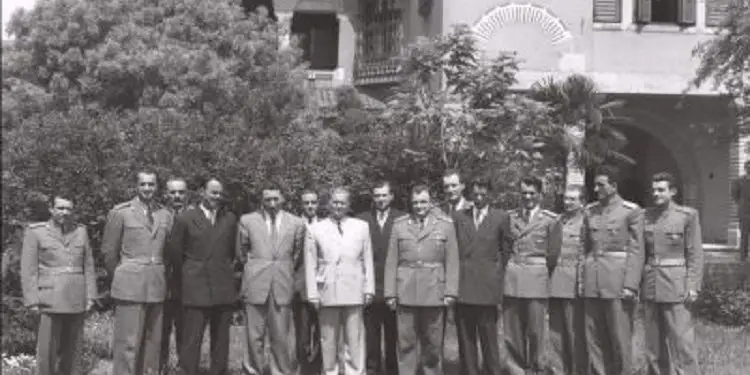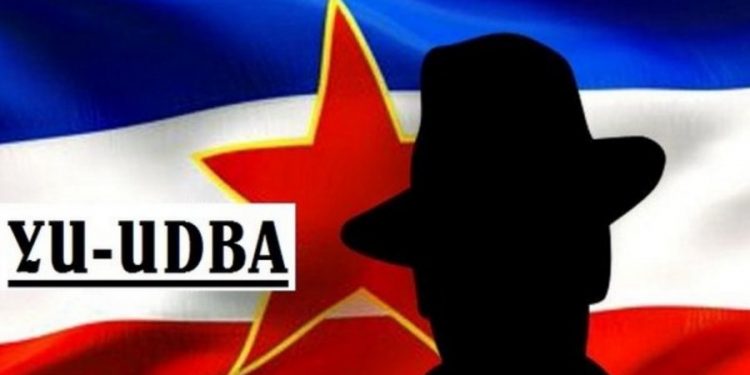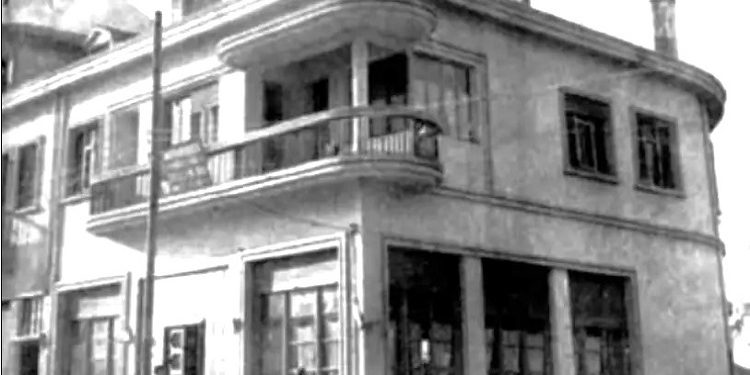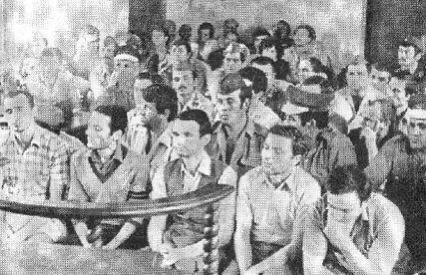By Nafi Çegrani
Part Two
THE PHENOMENON OF YUGOSLAV ESPIONAGE
Memorie.al / Espionage, known since ancient times as the “invisible eye of power,” always took on a tragic and bloody hue in the Balkans. In this space where empires have clashed like waves upon rocks, secrecy and betrayal became common currency. For Albanians, this phenomenon was not just a technique of the rulers to control the people, but a wound that was embedded in the collective psychology and historical consciousness. At its core, espionage is not simply the collection of information – it is refined violence upon the human mind, interference in the most intimate areas of freedom. It mixes fear with suspicion, causing man to lose his inner peace and society to fragment from mistrust. In this sense, espionage is the second act of slavery: the first is physical chains; the second is the imprisonment of the conscience.
Continued from the previous issue
The methods used for recruitment included:
- Personal and moral blackmail: information about private life or family ties was turned into an instrument of pressure.
- Ideological background: recruitment was often presented as “service to the revolution” or “defense of the nation,” masking the real pressure.
- Use of material benefits: economic privileges, trips abroad, career opportunities – all served as traps.
- Manipulation of personal affections: friends, colleagues, lovers – often used to persuade the individual to cooperate.
It must be understood that this system created a constant tension between the desire for freedom and the fear of consequences. Many individuals refused to cooperate and found they facing isolation, prison, or social death. Those who accepted often became silent participants in a great mechanism of manipulation, carrying a silent moral and existential battle in their souls.
As such, with operational combinations and silent missions, the agent networks fragmented society. Trust turned into a luxury, while suspicion became the norm. The Albanian diaspora in the West, especially in the ’60s-’80s, faced infiltration by the UDB and the Sigurimi, leading to divisions in emigrant organizations and a loss of collective power.
Essentially, it must be understood that the recruitment of agents and informants, as a specific phenomenon of the issue we are addressing, is a reflection of the tension between fear and freedom, between survival and conscience. The Albanian history of the communist period, but also the experience of the Balkans and the Eastern Bloc, shows that the individual often has to balance between two worlds: a visibly safe world and a secret world of the soul that seeks freedom and honesty.
Again I say that, however, agent networks and sophisticated recruitments are not just stories of secret services. They are stories about human nature, about the tension between morality and fear, and about the permanent challenge of preserving inner freedom, even when the invisible eye of power seems to cover everything. The examples of Albanian individuals show that, even under the greatest pressure, there is an opportunity to preserve dignity and conscience, as a permanent act of freedom.
COMMUNIST AGENCIES AND THE LABYRINTH OF DUPLICITY
The agent networks of Yugoslavia and the Eastern Bloc were more than just intelligence services; they were sophisticated control organisms, where each individual was a node in an unknown and hard-to-understand labyrinth. At the top was the narrow hierarchy: high political and military leaders, who defined the strategic objectives, and below them, the structure of operational officers, instructors, and coordinators covering regions, cities, and villages.
In Yugoslavia, the OZNA and later the UDB set up networks territorially and sectorally. Each region had an operational center that supervised spies, informants, and saboteurs. Volunteer informants often entered the system as a “secret eye” within the community, but many of them later turned into double agents, working simultaneously for the UDB and for other services of influence, or to protect themselves from the dangers posed by sole collaboration.
In the Eastern Bloc, agent networks, such as the KGB in the Soviet Union, the Stasi in East Germany, and the Służba Bezpieczeństwa in Poland, were structured more hierarchically and with more advanced technological means. They used a combination of electronic surveillance, secret informants, and agents infiltrated in emigration. The system was such that all information passed through several levels of control, making its external verification almost impossible.
Double agents were an indispensable instrument of these networks. They could serve two services simultaneously: once as a source of information for the service that recruited them and once to protect their own interests or those of their community. A typical case is that of some young Albanians recruited by the UDB in Kosovo, who then maintained secret ties with the Albanian State Security (Sigurimi i Shtetit). This dual status exposed individuals to fear, double suspicion, and endless moral responsibility.
The connections with Albania were also sophisticated and secret. Yugoslav and Eastern Bloc networks monitored Albanian emigrants in neighboring countries and in the West, using saboteurs and informants to destroy emigrant organizations, to stage accusations, and to control the political activity of the diaspora. The Albanian State Security often used these networks to identify and isolate individuals within the country, creating a complex system of surveillance with two directions: from the outside and from the inside.
Viewing these issues as specifics in a psychological aspect, this mechanism created an invisible atmosphere of fear and suspicion. The Albanian and the double collaborators lived with a permanent tension: every action could be interpreted; every word could be turned against them. The agent network struck not only the body, but also the conscience and the spirit, making morality a special kind: a morality of survival, secret and separate from public values.
Whereas, if we take a sociological approach, such networks were powerful instruments for dividing communities. Trust turned into a luxury, while suspicion became the norm. Division, isolation, and control became permanent elements of daily life, deforming not only the relationships between individuals but also the very idea of community and solidarity.
Because, it is more than understandable that agent networks are a metaphor for the power that sees everything and everyone, but at the same time they are proof of the power of human conscience. They show that, even under the greatest pressure, man can preserve morality and dignity, choosing the silence of conscience in the face of external darkness. The history of agent networks, both in Yugoslavia and in the Eastern Bloc, is the story of a continuous battle between absolute control and the inner freedom of the human spirit.
MIGRATION AND SACRIFICE IN THE ANNALS OF ESPIONAGE
Against the backdrop of sophisticated agent networks, the Albanian individual often turned into a silent player in a theater where every move had consequences. Each agent or informant was a world unto themselves, a battle between fear, survival, and moral conscience.
A typical case is that of Mustafë Lleshi, as I have mentioned in a separate article of mine or in the book titled “The Saboteurs” (Diversantët). Stafa, as a border commander in northern Dibra, after fleeing from Yugoslavia in the early ’50s, faced constant suspicion from both services: the UDB sought him as an “enemy of the state,” while the Albanian State Security monitored him to see if he was collaborating with any external network. He was forced to choose his own moral path, refusing any attempt to spy on his compatriots and preserving his integrity, despite the personal and family risks.
Another example comes from Kosovo in the ’60s, where some Albanian students at the universities of Belgrade were recruited by the UDB to report on the activities of their colleagues. Some of them became double agents: externally they reported to the UDB, while within the Albanian community they kept secret information to protect their friends from baseless accusations. They lived with constant moral and emotional tension, knowing that any action could turn into a tragedy for themselves or for others.
In Albania, some intellectuals and artists were recruited by the State Security to monitor the cultural and academic activities of their friends. A number refused to cooperate and faced imprisonment, punishment, and internment, while others accepted, often to protect their families. Their story shows the permanent dilemma between survival and moral loyalty. Some kept important data secret to save lives, living with the double burden: fear and conscience.
The cases of double agents are particularly dramatic. They often had connections with two different services: once as a source of information for the power that had recruited them, and once to preserve their own interests or those of the community. This dual status placed the individual in a silent psychological battle: every decision had a moral and vital consequence.
I emphasize that all these individuals developed a silent activity as a special form of morality, a secret morality, which was not reflected in public. They learned to act carefully, to maintain trust, but also to intervene to save the innocent. Sociologically, they were the node that connected two opposing worlds: the community destroyed by fear and the sophisticated agent networks that controlled every step.
Their migration and journey towards the gorges or long plateaus at the foot of mountains, or facing the crests of Korab, or along the paths towards Kalaja e Dodës, for those who set out from Yugoslavia, shows the permanent tension between inner freedom and the domination of invisible power, the abductions in their thoughts of being and existence.
Or, on the other hand, we also have the history of Albanian agents whose actions teach us that, even when control mechanisms on the border lines, or otherwise, seem to cover everything, man can preserve integrity, honesty, and conscience – as a permanent act of human freedom in the face of storms and mountains.
In Kosovo in the early ’60s, a group of Albanian students was recruited by the Yugoslav UDB to monitor the activities of the Albanian community at the universities of Belgrade and Pristina. They were young boys and girls, enthusiastic about knowledge and dedicated to their national identity, but suddenly found themselves involved in the sophisticated network of espionage.
At first, the recruitment was presented as an opportunity to help the country and to receive scholarships for studies abroad. But it soon became clear that their task was to keep notes on the activities of friends and professors, to report any suspicious discussions about politics or national issues, and to transmit information to the UDB’s operational centers.
The moral dilemma was immediate and continuous. Many of the students felt betrayed by themselves: every report they made could cause arrests or punishments for their fellow students. Some refused cooperation, facing threats, loss of scholarships, or forced internment. Others accepted, often to protect their families from the risks that refusal brought, turning into double agents: externally they reported to the UDB, while within the community they maintained the secrecy of data that could save their friends.
Situations of sacrifice were daily. One of the students, maintaining secret contacts with his Albanian professors in Pristina, used the reported information to avoid the arrest of some colleagues. Another, working as an informant for the UDB, accepted losing ties with his family to keep his own actions secret. Each decision was an internal battle between fear, responsibility, and moral conscience.
The consequences of their journey were severe. Some lost scholarships and academic opportunities; some faced fabricated charges and symbolic sentences, while others lived for years with the double psychological burden: fear of the secret service and the moral pain of severing ties with the community. However, for many of them, the greatest sacrifice was preserving their integrity and conscience, choosing not to betray their values, despite the high personal cost.
This group of Albanians is an example of a permanent reality in communist agent networks: ordinary individuals placed in a moral labyrinth where every action has consequences, where every report can turn into an enemy, and where the inner freedom of the spirit is the only form of resistance that cannot be controlled by power. Their stories show that, even within the double darkness of espionage, there is a space for humanity, morality, and conscious sacrifice.
YUGOSLAV NETWORKS AND THE ALBANIAN SIGURIMI
After several years of operating within the Yugoslav network, the group of Albanian students faced a new situation: the Albanian State Security began to monitor their activity, trying to identify individuals who could be influenced by “external enemies” or who could be an instrument of the UDB. At this moment, the students were immersed in a double game, where every step could bring serious consequences.
Some of them, knowing the experience and the risks of the UDB, decided to create a secret network within the Albanian network, communicating controlled information to the State Security to avoid repressive actions against them and their compatriots. They used sophisticated means of secrecy: coded letters, secret meetings, and double messages, trying not to cross any line that might expose them.
The dilemmas and conjectures became deeper than ever. Because here was a field of action for conspiratorial missions, where everything was under pursuit and surveillance…! For example, any report to the Sigurimi could be considered a betrayal of the UDB; any wrong move could lead to the arrest of a friend, while silence could cause baseless punishments. Some students decided to use the information they gathered to protect their compatriots, risking their careers and their lives. One of the boys in the group, being aware of a UDB action targeting an Albanian professor, secretly informed the Sigurimi, saving his life and becoming a double agent with full awareness of the risks.
Situations of sacrifice were daily: some lost the opportunity for studies abroad, some were isolated from the academic community, and others lived with the constant fear that a single mistake could expose them to both networks. Psychologically, this double game created an endless tension, a pressure that formed a special secret morality and constant caution towards every word and action.
There were cases when the group’s interaction with both networks showed the power of fear and control over the individual. It illustrated how secret services affect not only the body and movements of a person but also the conscience and relationships within the community. Trust among the students was transformed into a delicate balance between cooperation, survival, and secret solidarity.
And, it is more than clear that this journey shows the tension between inner freedom and absolute control. Every student who acted with conscience within this double game became a symbol of moral resistance: a testimony that, even in the midst of the most sophisticated surveillance mechanisms, the individual can preserve dignity and integrity.
This group of Albanians shows that espionage is not only an instrument of power but also a mirror of moral choices, of sacrifice, and of human spiritual strength. Their history reminds us that, even within the most absolute darkness of surveillance, there is the possibility to preserve the light of conscience and human values.
In the years 1960–1962, a group of Albanian students in Pristina and Belgrade was recruited by the Yugoslav UDB under the pretext of “cooperation for academic and cultural development”.
At first, they believed it was an opportunity to advance in their studies and to help the community. But it soon became clear that their task was to keep notes on the activities of friends, professors, and Albanian cultural organizations. Some students refused immediately, facing constant pressure and threats of losing their scholarships or internment. Those who accepted turned into silent double agents.
Mid-’60s – Tension and Moral Dilemmas
From 1963 to 1966, the group also began to interact with the Albanian State Security. The Albanian service monitored their activity to identify “foreign infiltrations” and to protect the interests of the communist state. The students faced severe dilemmas: any report submitted to the UDB could be considered a betrayal of their country; any silence could cause harsh punishments from the Sigurimi.
One of the students used the gathered information to warn Albanian professors about a UDB action, saving several lives and becoming a double agent with full awareness of the risks./ Memorie.al
To be continued in the next issue
















